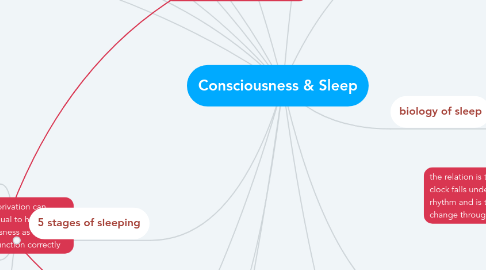Consciousness & Sleep
von Antonio Giliana


1. meditation & hypnosis
1.1. tries to place a person in a conscious state that is super relaxed
1.2. hypnosis is essentially the placebo effect, b/c there is no scientific proof that it works
2. psychedelics
2.1. alter perception of the world and cause hallucinations
2.2. people tend to have a. mythical experience, and personality changes
3. cocaine
3.1. labelled as a "psychostimulant", it increases alertness, decreases fatigue and stimulates sexual arousal
3.2. is very addicting due to the tolerance
4. altered consciousness
5. 5 stages of sleeping
5.1. stage 1: (NREM) Non-rapid Eye Movement: light sleep
5.2. stage 2: (NREM) harder to wake an individual
5.3. stage 3 and 4 (NREM) Deep sleep, Delta waves occur and this is where sleep walking can occur
5.4. stage 5 (REM) Paradoxical sleep: vivid dreaming and rapid eye movement
6. REM Sleep
6.1. REM Sleep: Rapid Eye Movement sleep
6.2. - a kind of sleep that occurs at intervals during the night and is characterized by eye movement
7. dreams
7.1. there are theories as to why we dream:
7.2. symbolic of our deep desires
7.3. no hidden meaning, continuation of day time
7.4. reflection of the brain's attempt to make sense of random signals during REM
7.5. dreams provide a person with opportunity to rehearse situations
8. sleep disorders
8.1. insomnia is the most common disorder, and it refers to a sleep disorder in which patients have trouble staying asleep, and going to sleep
8.2. narcolepsy: unexpected sleep
8.3. sleep apnea: constant awakening during sleep, caused by blocked airways
8.4. night terrors: sudden waking episodes, includes loud screaming, confusion, etc.
8.5. sleep walking
9. drugs
9.1. anti-psychotics
9.2. stimulants
9.3. hallucinogens
9.4. depressants
10. alcohol
10.1. being the most used drug, alcohol is a depressant, but tends to feel like a stimulate.
10.2. alcohol can effect sleep by inducing it, meaning you get too drunk you fall asleep.
11. what is consciousness?
11.1. consciousness is the subjective experience of the world around us
12. states of consciousness:
12.1. alertness/wakeness
12.1.1. Beta 15-30 Hz: awake, normal alert consiousness
12.2. daydreaming
12.2.1. Alpha 9-14 Hz: relaxed, calm, meditation, creative visuals
12.3. drowsiness
12.3.1. Theta 4-8 Hz: deep relaxation and meditation, problem solving
12.4. sleeping
12.4.1. Delta 1-3 Hz: deep, dreamless sleep
13. biology of sleep
13.1. circadian rhythms: refers to the cyclical biological changes, based on a 24-hour basis
13.1.1. this is made up of hormones which include: hormone release, brain waves, etc.
13.2. disruption of sleep, can cause major health problems
14. 24-Hour Rhythm
14.1. fwithin the 24-Hoiur Rhythm image, there iare roughly 14 levels
14.1.1. noon falls under Beta Hz (15-30) which is when you are most alert
14.1.2. midnight - 2 am, falls under the Delta stage of consciousness. It is when you're in deepest sleep
15. sleep deprivation
15.1. we need about 7-10 hours of sleep a day, which is roughly 1/3 of our day
15.2. resisting sleep has many negative impacts on your life:
15.2.1. lack of sleep consists of: weight gain, depression, decreased immune system
15.2.2. difficulty learning, decreased ability to pay attention, slowed reactions, hallucinations, and an increase risk for cancer
